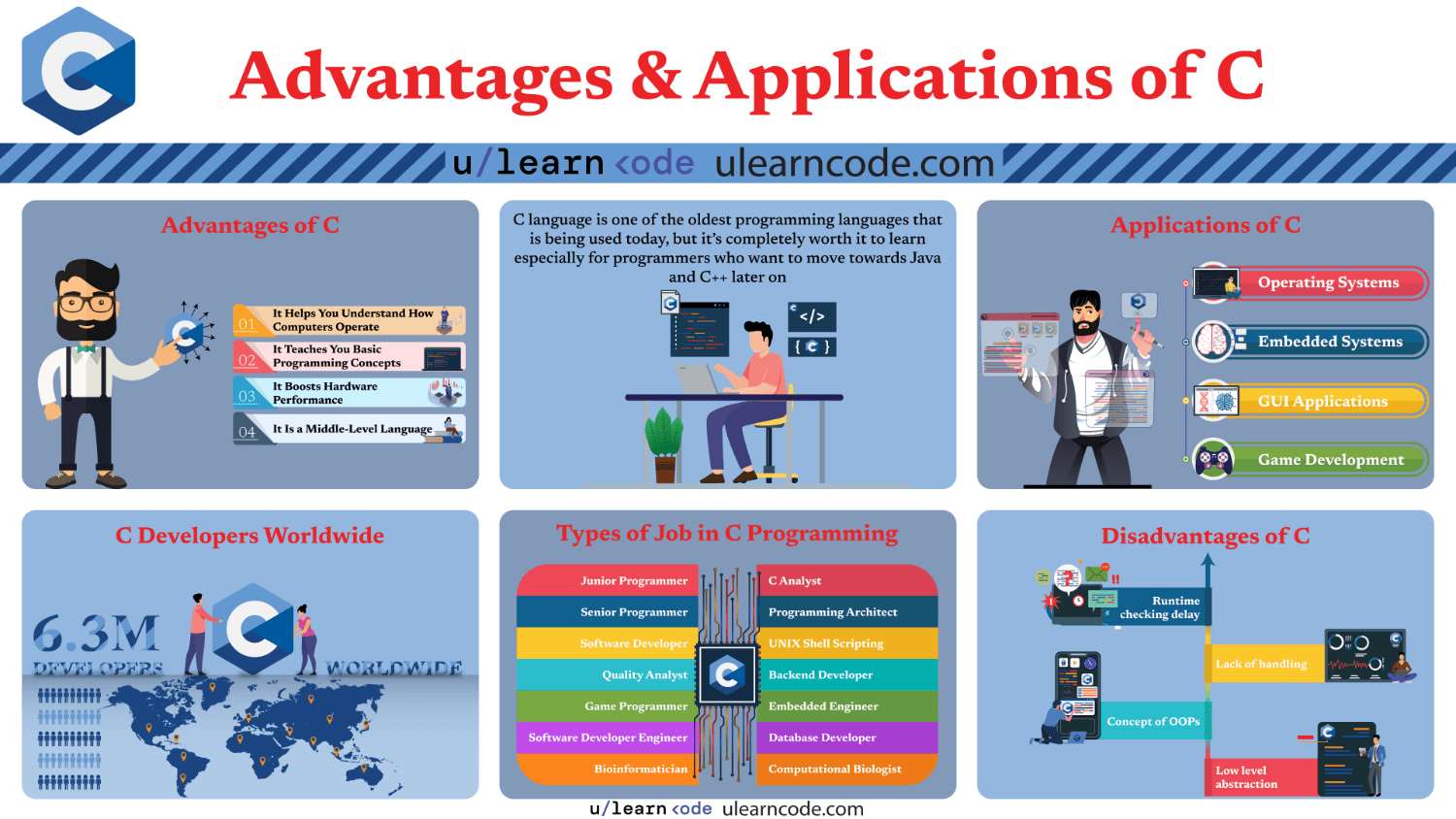Contents
C is a structure-oriented programming language that was developed in 1972. It is considered one of the oldest and most fundamental languages that is still widely being used all over the world.
Professional programmers tend to learn C to form a strong core foundation of their career. Once a programmer has a strong mastery of C then it becomes easy to learn other languages such as Java and C++ because the syntax is very similar.
C facilitates systems that require direct access to hardware components. C is more preferable for systems where a performance boost is required to run most of the applications.
C language was created with the main aim of developing operating systems and to change UNIX Kernel code from a low-level to a high-level language. In today’s world, C has various applications and uses.
What Is C Programming Used for?
C is an extremely versatile, and supports operating systems, compilers, databases, embedded systems, and more. It is also widely used to develop performance-oriented systems or desktop applications.
Some major uses of C language are discussed below.
1. Operating Systems
Most of the operating systems that we use today are coded in C language. Microsoft Windows is a popular OS that is mostly coded in C language. Other OS such as Linux, Mac, iOS, and Android are also written in C which clearly depicts its dominance.
The use of C language in Operating System’s kernels is huge, and many developers still use C to code Kernels for newer operating systems that require a strong core with fast performance.
If you also want to become an OS developer, then Operating System development courses will guide you through the whole process.
Other operating system development languages such as Python and C++ are also used, but they are not considered superior in this major domain.
2. Embedded Systems
Embedded systems require drivers and applications in order to work properly. Most of these drivers are developed using C. It is very close to system hardware components, so it is preferred for such drivers to boost performance.
Many devices such as our digital alarm clocks, microwaves, or coffee maker chipsets might also be programmed using C as they fall under the embedded systems category. There are millions of embedded devices and most of them use C to work properly.
There are numerous other languages that work with embedded systems such as Python, C++ and Rust, but C is preferred among programmers when it comes to such systems.
3. GUI Applications
The C language is also used to develop GUI Applications. C was used in the development of a popular editing tool called Adobe Photoshop. It was also used in the earlier versions of Adobe Premiere and Adobe Illustrator.
C is an option for such applications, but other languages for GUI Applications development include options like Java and C# that are far ahead of C in this particular domain. Some people also prefer Python for GUI Applications as it provides numerous relevant libraries and frameworks.
C remains unbeatable due to its performance. If you still want to develop GUI applications, then there are numerous good GUI Application Development courses available to guide you step by step.
4. Game Development
Many mobile phone games in older models such as Snake game, Tic-Tac-Toe, and other such simple games were designed using the C language. C is still preferable for small games because it provides an extreme boost to the performance.
Many modern games are also developed using some of the C libraries and by integrating game graphics. One of the most popular modern game examples is Doom 3, a first-person shooter game developed purely with C.
Overall, C language is capable of developing modern games, but some other game development languages are more dominant such as C++ and C#.
Also, there are a variety of best game development courses available that teach you using modern gaming engines and preferable programming languages.
Advantages of C Programming

Some people might see no point in learning C as it is old and a little complex, but there are a number of reasons that make this language still worth learning:
1. It Helps You Understand How Computers Operate
As C is a core language used in operating systems, it will give you a deep understanding of how things work in a computer system.
2. It Teaches You Basic Programming Concepts
The syntax of C language is used as a base in other languages like Java and C++. It’s preferable for programmers to learn C because it gives them a stronger grip over other development languages. If you are eager to learn it, then choose from the best C courses to make your journey enjoyable and easy.
3. It Boosts Hardware Performance
C is closer to our system hardware components. So, whenever a program, OS, or driver is written in C, it ensures the fast execution of that program.
4. It Is a Middle-Level Language
High-level languages are closer to humans while low-level languages are difficult to understand and closer to our system hardware. C keeps the balance between both worlds. C is close to machines as well as humans, which makes its execution better while accepting direct input from programmers.
Conclusion
C language is one of the oldest programming languages that is being used today, but it’s completely worth it to learn especially for programmers who want to move towards Java and C++ later on.
The language gives you a deep understanding of how all of your operating systems work along with the capabilities to develop your own OS Kernels. There are many languages other than C, but it is mainly dominant in embedded and operating systems.